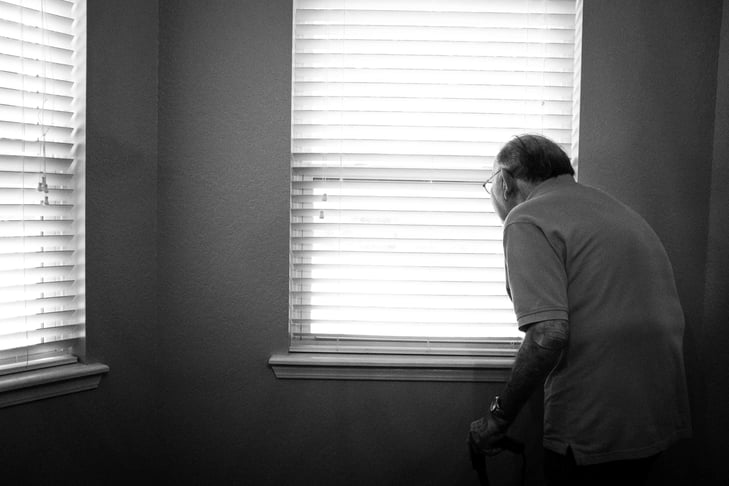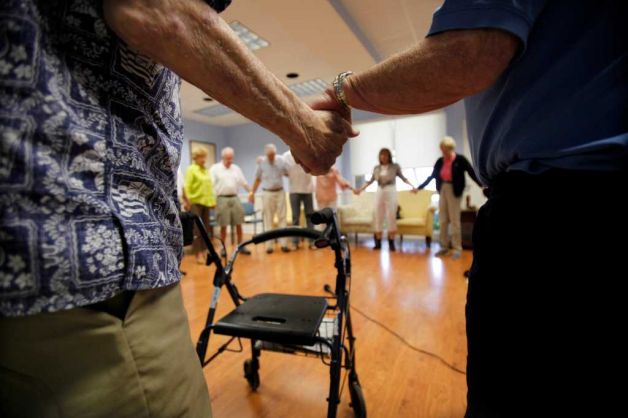
Mom’s calling from upstairs again. For goodness’ sakes, I was just up there! Now she needs help getting to the bathroom? Why didn’t she tell me a minute ago?
She was up half the night. I got no sleep. I’m late getting the kids ready for their swimming lessons, the house is a mess, there’s no one else to help and no one even had breakfast today. And with the memory problems and the doctor appointments?
I can’t keep doing this. Lord knows we can’t afford to bring in a home nurse. And Mom won’t hear of it anyway. She’ll say she doesn’t want some stranger taking of her. Why won’t she at least consider moving to a senior home?
Am I a terrible person for wishing my mother would live somewhere else? I feel so guilty all the time, but I can’t get a moment’s peace. How long is this going to go on?
OK, stop.
If this sounds familiar, sit down and take a deep breath.
Listen carefully:
You. Are not. Alone.
Family caregivers constantly deal with feelings of guilt: that they’re not spending enough time with their older loved ones, that they’re not tending to their own growing families, that they’re having negative feelings about the vulnerable parent or grandparent who needs them.
And it’s a growing problem, too.
An estimated 40.4 million Americans provide uncompensated care for seniors, and that number is projected to continue growing as the Baby Boom generation reaches peak retirement over the next decade. Of those unpaid caregivers, the largest share are adults in middle age: prime time for raising families and working in their own careers.
And many of them experience emotions similar to those you might be experiencing: exhaustion, depression, grief, resentment and guilt are all negative feelings that family caregivers commonly report, according to AARP contributor Sally Abrahms.
So, really. You’re not alone.
Here are 4 ways you can cope.
1. Pay attention to how you feel and acknowledge negative feelings
Sweeping negative emotions under a mental rug isn’t going to help you or your loved one. In fact, it’s likely to contribute to a building pressure. One day, you might not be able to hold yourself together any longer.
Instead of wishing negative feelings away, allow yourself to have them. Air them out. Talk to someone about how you’re feeling.
View More: Cincinnati Caregivers Find Support at Marjorie P. Lee Retirement Home
Reach out to a friend, your spouse, another family member, or attend a caregiver support group (there are many in Cincinnati, including the monthly support group that meets here at Marjorie P. Lee Retirement Community).
2.Build a relationship with your “new” loved one
One of the more difficult aspects of caregiving to accept is seeing drastic change in an older loved one. After a debilitating stroke, or with the onset of Alzheimer’s dementia, a parent who once provided for your every need — who you always turned to for support and solace — might not be the physical, mental or emotional rock you came to depend on.
It can be a shock. And it triggers a grief process. In some ways, it can be more difficult to grieve for an elder who is still living than it it is for one who has recently passed.
Abrahms recommended you “forge a way to relate to the ‘new’ person.” Her mother — a former university English professor, avid reader and arts patron — suffered a stroke in 2008, leaving her unable to read or to attend performances.
“My mother had always loved poetry, so I would bring Robert Louis Stevenson's A Child's Garden of Verses, a collection of the same poems she had once read to me and I had read to my children, when I visited,” Abrahms recalled. “She'd smile as we finished the lines together, and I felt close to the mother I remembered while relating to the person she had become.”
3. Seek out respite care
Caregivers need care, too. If you’re feeling exhausted, stretched too thin, hopeless, or depressed, you need a break. Allow yourself to take one — no guilt. Respite care services allow caregivers to have time unto themselves.
You might enroll your older parent in an adult day care so that you have a few hours to yourself every day to work, run errands, or just relax. Or, you might arrange for your loved one to stay at a retirement home like Marjorie P. Lee for a few days or weeks every few months, so that you can take a vacation and catch up on self-care.
You can also take advantage of ERS’s Living Well Senior Solutions. This service covers a wide range of needs, including connecting you with healthcare partners, answering insurance questions, helping with the transition from the hospital or rehab to home and even accompanying you on doctor’s visits.
View More: Living Well Senior Solutions
There’s no guilt to be had in any scenario. Those are smart moves — they’ll help you to avoid burnout and make you a better caregiver in the long run.
4. Don’t try to be the perfect caregiver
As Mayo Clinic blog contributor Angela Lunde suggested, don’t try to be the perfect caregiver. Strive to be a “good-enough” caregiver. If you can allow yourself not to be perfect, you’ll find that the guilt you feel now will naturally ebb away.
Ask yourself: is your loved one happy? Would he or she be better off in someone else’s care? Would you have more peace or less peace of mind if your older mom or dad lived elsewhere?
If you keep coming back to the answer that your elder is best off with you, then giving yourself room not to keep everything perfectly balanced all the time will help you to render the best care you can, without negative feelings.














